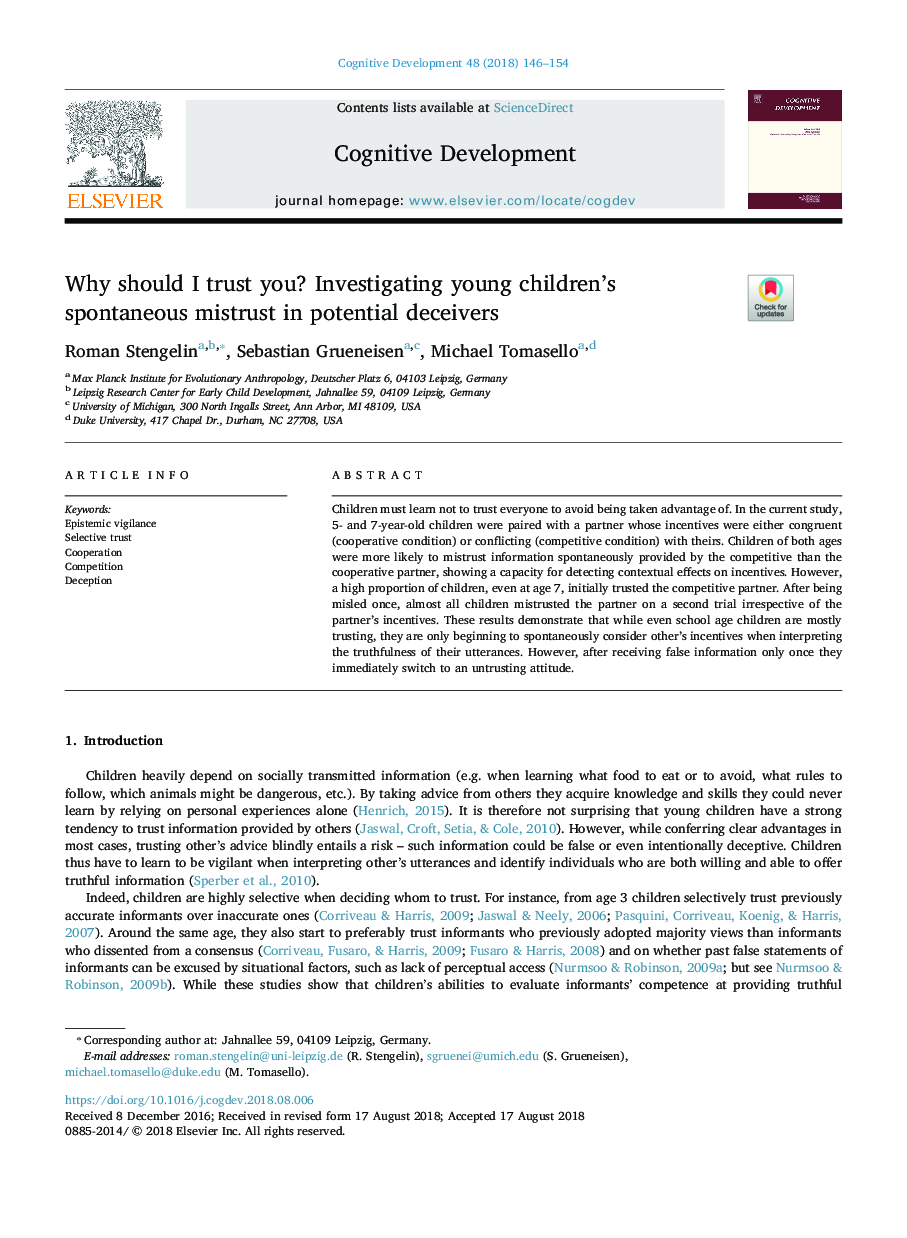| کد مقاله | کد نشریه | سال انتشار | مقاله انگلیسی | نسخه تمام متن |
|---|---|---|---|---|
| 11004495 | 1473335 | 2018 | 9 صفحه PDF | دانلود رایگان |
عنوان انگلیسی مقاله ISI
Why should I trust you? Investigating young children's spontaneous mistrust in potential deceivers
ترجمه فارسی عنوان
چرا باید به شما اعتماد کنم؟ بررسی بی اعتمادی خود به خودی کودکان کودکان در فریبنده های بالقوه
دانلود مقاله + سفارش ترجمه
دانلود مقاله ISI انگلیسی
رایگان برای ایرانیان
کلمات کلیدی
هوشیار شناختی، اعتماد انتخابی، همکاری، رقابت، فریب،
ترجمه چکیده
کودکان باید یاد بگیرند که به هیچکس اعتماد نکنند تا از مزیت استفاده نکنند. در مطالعه حاضر، کودکان 5 تا 7 ساله با یک شریک که انگیزه های آنها هم سازگار (شرایط مشارکت) و یا مناقشات (شرایط رقابتی) با آنها بود، زوج بود. کودکان هر دو ساله بیشتر احتمال عدم اطمینان به اطالعات را دارند که خود به خودی آن توسط رقبای شریک تر از شریک تعاونی ارائه می شود، و ظرفیت تشخیص اثرات متقابل را بر انگیزه ها نشان می دهد. با این حال، تعداد زیادی از کودکان، حتی در سن 7 سالگی، در ابتدا شریک رقابتی را مورد اعتماد قرار دادند. پس از گمراه شدن یک بار، تقریبا تمام کودکان، شریک زندگی خود را در محاکمه دوم، بدون در نظر گرفتن انگیزه شریک زندگی، بی اعتبار می کنند. این نتایج نشان می دهد که در حالی که حتی کودکان مدرسه اکثرا اعتماد دارند، تنها در صورتی که تفسیر حقیقت سخنرانی های خود را به طور خودکار در نظر بگیرند، انگیزه های دیگر را در نظر می گیرند. با این حال، پس از دریافت اطلاعات نادرست تنها یک بار آنها بلافاصله به یک نگرش غیر قابل اعتماد تبدیل می شوند.
موضوعات مرتبط
علوم انسانی و اجتماعی
روانشناسی
روانشناسی رشد و آموزشی
چکیده انگلیسی
Children must learn not to trust everyone to avoid being taken advantage of. In the current study, 5- and 7-year-old children were paired with a partner whose incentives were either congruent (cooperative condition) or conflicting (competitive condition) with theirs. Children of both ages were more likely to mistrust information spontaneously provided by the competitive than the cooperative partner, showing a capacity for detecting contextual effects on incentives. However, a high proportion of children, even at age 7, initially trusted the competitive partner. After being misled once, almost all children mistrusted the partner on a second trial irrespective of the partner's incentives. These results demonstrate that while even school age children are mostly trusting, they are only beginning to spontaneously consider other's incentives when interpreting the truthfulness of their utterances. However, after receiving false information only once they immediately switch to an untrusting attitude.
ناشر
Database: Elsevier - ScienceDirect (ساینس دایرکت)
Journal: Cognitive Development - Volume 48, OctoberâDecember 2018, Pages 146-154
Journal: Cognitive Development - Volume 48, OctoberâDecember 2018, Pages 146-154
نویسندگان
Roman Stengelin, Sebastian Grueneisen, Michael Tomasello,
